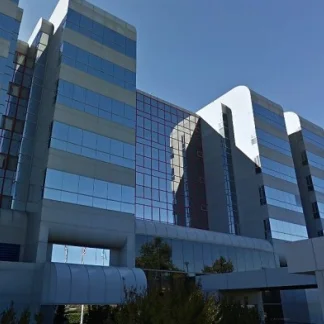Guilford County Mental Health
Guilford County Mental Health is a public rehab located in High Point, North Car...
High Point Behavioral Health is a dual diagnosis mental health and substance use disorder treatment center for adults, located in High Point, North Carolina. The center also provides important community services, including case management and community referrals.
Addiction services at High Point Behavioral Health include mental health assessments and counseling, detox, outpatient addiction treatment, and inpatient dual diagnosis mental health and addiction treatment.
Staff use assessments to evaluate each client’s mental health status, addiction severity, and any co-occurring disorders. Results inform individualized treatment planning. Therapeutic treatments include individual, group, and family counseling.
The detox program allows patients to safely and comfortably detox from drugs and alcohol. Following detox, participants are referred to an addiction treatment program.
Dual diagnosis treatment applies evidence-based practices to treat addiction and co-occurring mental health diagnoses. The program is available for adults aged 18 and older. Treatment begins with a comprehensive mental health assessment and is followed by counseling, group work, and psychoeducation.
Outpatient programs are for individuals who would benefit from addiction treatment but do not require 24-hour supervision. Sessions are run during the day or in the evenings and involve individual and group therapy, educational groups, relapse-prevention strategies, and aftercare planning.
Contact us for more information: (800) 525-9375

Connect with High Point Behavioral Health by calling their admissions team directly.
(800) 525-9375 Website Get DirectionsCognitive Behavioral Therapy (CBT) is a therapy modality that focuses on the relationship between one's thoughts, feelings, and behaviors. It is used to establish and allow for healthy responses to thoughts and feelings (instead of unhealthy responses, like using drugs or alcohol). CBT has been proven effective for recovering addicts of all kinds, and is used to strengthen a patient's own self-awareness and ability to self-regulate. CBT allows individuals to monitor their own emotional state, become more adept at communicating with others, and manage stress without needing to engage in substance abuse.
Group therapy is any therapeutic work that happens in a group (not one-on-one). There are a number of different group therapy modalities, including support groups, experiential therapy, psycho-education, and more. Group therapy involves treatment as well as processing interaction between group members.
In individual therapy, a patient meets one-on-one with a trained psychologist or counselor. Therapy is a pivotal part of effective substance abuse treatment, as it often covers root causes of addiction, including challenges faced by the patient in their social, family, and work/school life.
Trauma therapy addresses traumatic incidents from a client's past that are likely affecting their present-day experience. Trauma is often one of the primary triggers and potential causes of addiction, and can stem from child sexual abuse, domestic violence, having a parent with a mental illness, losing one or both parents at a young age, teenage or adult sexual assault, or any number of other factors. The purpose of trauma therapy is to allow a patient to process trauma and move through and past it, with the help of trained and compassionate mental health professionals.
Group therapy is any therapeutic work that happens in a group (not one-on-one). There are a number of different group therapy modalities, including support groups, experiential therapy, psycho-education, and more. Group therapy involves treatment as well as processing interaction between group members.
In individual therapy, a patient meets one-on-one with a trained psychologist or counselor. Therapy is a pivotal part of effective substance abuse treatment, as it often covers root causes of addiction, including challenges faced by the patient in their social, family, and work/school life.
Trauma therapy addresses traumatic incidents from a client's past that are likely affecting their present-day experience. Trauma is often one of the primary triggers and potential causes of addiction, and can stem from child sexual abuse, domestic violence, having a parent with a mental illness, losing one or both parents at a young age, teenage or adult sexual assault, or any number of other factors. The purpose of trauma therapy is to allow a patient to process trauma and move through and past it, with the help of trained and compassionate mental health professionals.
In individual therapy, a patient meets one-on-one with a trained psychologist or counselor. Therapy is a pivotal part of effective substance abuse treatment, as it often covers root causes of addiction, including challenges faced by the patient in their social, family, and work/school life.
Trauma therapy addresses traumatic incidents from a client's past that are likely affecting their present-day experience. Trauma is often one of the primary triggers and potential causes of addiction, and can stem from child sexual abuse, domestic violence, having a parent with a mental illness, losing one or both parents at a young age, teenage or adult sexual assault, or any number of other factors. The purpose of trauma therapy is to allow a patient to process trauma and move through and past it, with the help of trained and compassionate mental health professionals.
Trauma therapy addresses traumatic incidents from a client's past that are likely affecting their present-day experience. Trauma is often one of the primary triggers and potential causes of addiction, and can stem from child sexual abuse, domestic violence, having a parent with a mental illness, losing one or both parents at a young age, teenage or adult sexual assault, or any number of other factors. The purpose of trauma therapy is to allow a patient to process trauma and move through and past it, with the help of trained and compassionate mental health professionals.
Guilford County Mental Health is a public rehab located in High Point, North Car...
Caring Services provides addiction treatment for those recovering from drug and ...
Daymark Recovery Services – Guilford Residential is a drug and alcohol rehab loc...
Youth Focus – Outpatient is a non-profit rehab located in High Point, North Caro...